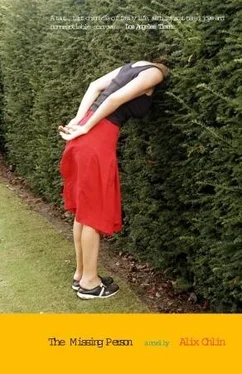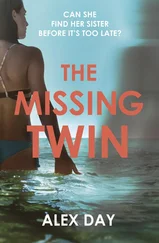I cruised through residential neighborhoods, at a speed that felt more like walking than anything gasoline-powered. Dogs lay still and panting in the shade of trees. Cats were in hiding. In someone’s yard two small children were playing a game that seemed to involve the simulation of vomiting. As I drove past, one of them lifted his arm and shook his fist at me.
Threatened by children, humiliated by yoga instructors, and sticking sweatily to the vinyl front seat, I finally pulled into my mother’s driveway. Nobody was home. I tossed my sweaty clothes onto a pile and took a quick, cold shower. Then I found a beer in the back of the fridge and sat in the backyard, the sweet relief of alcohol slipping down my throat, the wafting suburban smells comforting me: the charcoal smoke of backyard grills, the first hints of citronella, the gasoline putter of lawnmowers and weed whackers. I was half-asleep by the time a car door slammed shut out front and my mother and David came around the back.
“Hey, it’s Lynnie!” David said, holding out his hand. “We saw that fearsome contraption of your brother’s in the driveway and guessed you were back.”
I nodded. My mother, without meeting my eyes, gestured toward the back door. I held it open for her and she stepped inside, carrying a brown paper bag of groceries.
“You’ll join us for dinner, I hope,” David said.
In the kitchen my mother was making short work of the groceries. Into the crisper flew the broccoli and green beans. Up into cupboards went the cereal. The breadbox, of course, was the destination of bread. Plastic bags, empty, folded, and creaseless, met their fate in the recycling bin she kept beneath the sink. David and I stood on opposite sides of the kitchen, watching her.
“Nobody puts away a load of groceries like your mother,” he said fondly. Crouched down on the floor, rearranging some delinquent items on the lower shelf of the fridge, my mother blushed and glanced at him briefly, a swift, demure look that made me feel like an intruder. I was about to go back outside when she straightened up and held out a bottle of beer in my direction, still not looking at me. I opened it by covering it with the hem of my T-shirt and twisting, which David seemed to interpret as a sign of weakness.
“Let me do that for you,” he said, holding out his large hand.
“That’s okay. I’ve got it, thanks.”
“If you’re sure,” he said. I was already drinking from the bottle. He smiled down at my mother.
“Excuse me for a second,” I said. I walked down the hallway to my room, which in every respect contrasted poorly with the rest of the house: the bed was unmade, the floor littered with clothes that had a faint but unmistakably organic scent. I was becoming one of the great unwashed. Eva Kent’s paintings sat on the dresser, their thick layers of paint as violent and mysterious as ever. I sat down on the bed. In a pine tree just outside the window, a bird — I didn’t know what kind — cackled and squawked. The world was densely populated with things I did not know. There was a soft knock on the door, and my mother came in. She’d changed from her office clothes into shorts and a loose-fitting shirt, and looked comfortable but fatigued, very fine lines etched everywhere on her skin. “Everything all right?” she said.
“Mom,” I said, “I just didn’t have a very good day.”
She sat down next to me, and I remembered how, when I was sixteen, I’d been forced by my parents’ machinations to go on a date with Francie Garcia’s son, Luis. I had a zit on my forehead the size of a quarter and felt monstrous and degraded by adolescence. The date, by mutual consent, was short. I slunk home afterward and found my mother waiting for me on the couch in the living room, with the television on. My father had already gone to bed, and I sat down next to her, furious, undignified, and told her I would never let her do that to me again. Then I leaned my forehead against her shoulder and cried. “If you wait long enough,” she said, “this will all be over, and it will get better. I promise.”
Now, in silence, we sat in her condo with her married boyfriend here and Wylie not here, and I wondered if this was what she’d meant by “better.” Then she put her hand on the small of my back, still not saying anything, and I knew that this at least was true: in this house, on this day or any other, I would never be refused.
An uneasy peace is peaceful nonetheless. I was surprised at how happy I was, over the next few days, to play the good daughter, tidying up around the house and waiting for my mother to get home from work. I put all thoughts of Harold Wallace and his yogically contorted buttocks out of my mind. Several times we had dinner with David, the three of us marshaling enough energy for friendly conversation about topics of the day. We never talked about Wylie. David’s manner toward me became less bombastic, more subdued, and he no longer cried out my name like a cheer every time he saw me. This came as a relief. My mother cooked a sequence of elaborate meals — from braised lamb shank to chicken satay— which she arranged on serving plates in displays worthy of food magazines. There were desserts and specially chosen wines. She emerged from the kitchen bearing fragrant dishes, blushing proudly at our praise.
I thought, None of this is so hard.
One sweltering Wednesday I even went down to her office so we could have lunch with Francie and Luis of the long-ago date. He and I ate enchiladas and watched our mothers beam at each other with pride. After a little while I understood what Francie had meant by saying she didn’t think Luis would ever settle down: he was gay. All his teenage awkwardness had been replaced with an almost intimidating social ease. He was beautifully dressed and mannered, pulling out chairs for his mother and mine; drawing his mother out on the subject of her spectacular garden; making us all laugh. Francie put her hand over his and squeezed it as she bragged relentlessly about his accomplishments at work and exclaimed how lucky she was to have him around. It verged on disgusting. Then, halfway through the meal, she excused herself to visit the ladies’ room, and I saw a trace of exhaustion emerge on his careful features. All this politeness and admiration and laughter was part of some agreement between them, some ongoing negotiation that made everything else, within limits, okay.
When Francie came back from the restroom, pink lipstick and blue eye shadow brilliantly reapplied, she asked what was new with Wylie these days.
My mother shook her head. “I’ve deferred to Lynnie,” she said. “She’s the only one who can talk to him.”
Francie gave me a generous and approving smile. “It’s so good you’re back!”
“I guess so,” I said.
“It’s been like that ever since they were children,” my mother went on. “Wylie would keep secrets that only Lynn could hear about. He’d creep into her bedroom at night and whisper them to her. Nobody else could know.”
I looked at her. I remembered Wylie chattering, and me telling him to shut up and go to sleep, but whether there was any exchange of secrets I couldn’t say. Luis smiled at me, sipping his iced tea.
“She even got Wylie to come back for dinner,” my mother said. “I’m hoping by the end of the summer, he might even spend the night. It’s like domesticating a wild animal. You have to take it a little bit at a time.”
Francie and Luis laughed. The tone of my mother’s voice was confident and humorous and, it seemed to me, utterly false. Not to mention the improbability of Wylie coming home any time soon. She was either offering the most favorable interpretation of events or else hoping that by presenting an optimistic scenario she could somehow make it real.
Читать дальше












